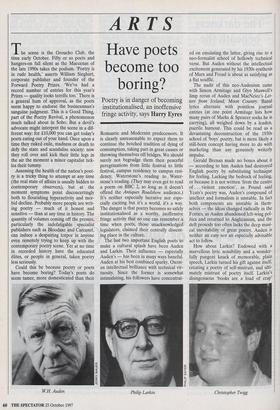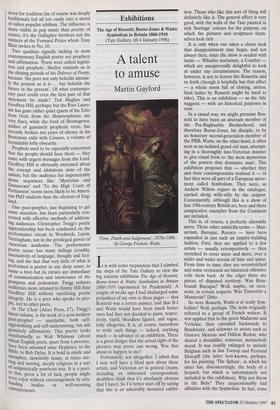ARTS
Have poets become too boring?
Poetry is in danger of becoming institutionalised, an inoffensive fringe activity, says Harry Eyres The scene is the Groucho Club, the time early October. Fifty or so poets and hangers-on fall silent as the Maecenas of the late 1990s takes the podium. 'Poetry is in rude health,' asserts William Sieghart, corporate publisher and founder of the Forward Poetry Prizes. 'We've had a record number of entries for this year's Prizes — quality looks terrific too.' There is a general hum of approval, as the poets seem happy to endorse the businessman's sanguine judgment. This is a Good Thing, part of the Poetry Revival, a phenomenon much talked about in Soho. But a devil's advocate might interpret the scene in a dif- ferent way: for £10,000 you can get today's poets eating out of your hand. Once upon a time they risked exile, madness or death to defy the state and scandalise society: now they roll over and kick their little legs in the air the moment a minor capitalist tick- les their tummy.
Assessing the health of the nation's poet- ry is a tricky thing to attempt at any time (the real state of affairs is usually hidden to contemporary observers), but at the moment symptoms point disconcertingly both to flourishing hyperactivity and mor- bid decline. Probably more people are writ- ing poetry — much of it honest and sensitive — than at any time in history. The quantity of volumes coming off the presses, particularly the indefatigable specialist publishers such as Bloodaxe and Carcanet, can induce a despairing torpor in anyone even remotely trying to keep up with the contemporary poetry scene. Yet at no time in recorded history have the educated elites, or people in general, taken poetry less seriously.
Could this be because poetry or poets have become boring? Today's poets do seem tamer, more domesticated than their Romantic and Modernist predecessors. It is clearly unreasonable to expect them to continue the botched tradition of dying of consumption, taking part in great causes or throwing themselves off bridges. We should surely not begrudge them their peaceful peregrinations from little festival to little festival, campus residency to campus resi- dency, Waterstone's reading to , Water- stone's reading. (They may even get to read a poem on BBC 2, so long as it doesn't offend the Antiques Roadshow audience.) It's neither especially lucrative nor espe- cially exciting but it's a world, it's a way. The danger is that poetry becomes so safely institutionalised as a worthy, inoffensive fringe activity that no one can remember a time when poets, those unacknowledged legislators, claimed their centrally dissent- ing place in the culture.
The last two important English poets to make a cultural splash have been Auden and Larkin. Their influence — especially Auden's — has been in many ways baneful. Auden at his best combined sparky, Oxoni- an intellectual brilliance with technical vir- tuosity. Since the former is somewhat intimidating, his followers have concentrat- ed on emulating the latter, giving rise to a neo-formalist school of hollowly technical verse. But Auden without the intellectual excitement generated by his 1930s synthesis of Marx and Freud is about as satisfying as a flat soufflé.
The nadir of this neo-Audenism came with Simon Armitage and Glyn Maxwell's limp rerun of Auden and MacNeice's Let- ters from Iceland, Moon Country. Banal lyrics alternate with pointless journal entries (at one point Armitage lists how many pairs of Marks & Spencer socks he is carrying), all weighed down by a leaden, puerile humour. This could be read as a devastating deconstruction of the 1930s school of 'boys' poetry, but is more likely a still-born concept having more to do with marketing than any genuinely writerly impulse.
Gerald Brenan made no bones about it — according to him Auden had destroyed English poetry by substituting technique for feeling. Lacking the bedrock of feeling, or because it is not written 'from the centre of . . . violent emotion', as Pound said Yeats's poetry was, Auden's compound of intellect and formalism is unstable. In fact both components are unstable in them- selves — the ideas changed radically in the Forties, as Auden abandoned left-wing pol- itics and returned to Anglicanism, and the deft prosody too often lacks the deep musi- cal inevitability of great poetry. Auden is neither an easy nor an especially advisable act to follow.
How about Larkin? Endowed with a marvellous lyric sensibility and a wonder- fully pungent knack of memorable, plain speech, Larkin turned his gift against itself, creating a poetry of self-mistrust, and ulti- mately mistrust of poetry itself. Larkin's disingenuous 'books are a load of crap' W.H. Auden Philip Larkin Christopher Twigg scorn for tradition (he of course was deeply traditional) fed all too easily into a mood of sullen populist nihilism. The influence is more visible in pop music than poetry: of course, it's the Gallagher brothers not the winners of the Forward Prizes whom Tony Blair invites to No. 10.
Two qualities signally lacking in most contemporary English poetry are prophecy and affirmation. 'Poets were called legisla- tors and prophets', Shelley reminds us in the shining periods of his Defence of Poetry, because 'the poet not only beholds intense- ly the present as it is . . . but beholds the future in the present'. Of what contempo- rary poet could even the first part of that statement be made? Ted Hughes and Geoffrey Hill, perhaps; but the Poet Laure- ate has gone rather quiet (parts of his Tales from Ovid, from the Metamorphoses, are very fine), while the bard of Bromsgrove, author of genuinely prophetic verse, has recently broken ten years of silence in his Bostonian exile with Canaan, a volume of formidably lofty obscurity. Prophets used to be especially concerned that the people should hear them — they came with urgent messages from the Lord. Geoffrey Hill is obviously exercised about the corrupt and idolatrous state of the nation, but the audience for impenetrably dense sequences like 'Mysticism and Democracy' and 'To the High Court of Parliament' seems more likely to be Ameri- can PhD students than the electors of Eng- land.
One poet-prophet, just beginning to get some attention, has been particularly con- cerned with effective methods of address- ing audiences. Christopher Twigg's poetic apprenticeship has been conducted on the Performance circuit in Woolwich, Luton, Nottingham, not in the privileged groves of American academia. The performance poetry scene has many failings (crudity, in sensitivity of language, thought and feel- ing, and the fact that very little of what is Performed is poetry in any deep sense, to name a few) but its virtues are immediacy of communication and intolerance of the Pompous and pedestrian. Twigg seduces audiences more attuned to Jimmy Hill than Geoffrey Hill without sacrificing poetic integrity. He is a poet who speaks to peo- ple, not to other poets. In The Choir (Alces Press, £7), Twigg's latest volume, is the work of a post-modern Poet-prophet — unreliable, both self- aggrandising and self-undermining, but still genuinely affirmatory. This poetry looks unashamedly to Walt Whitman (about whom English poets, apart from Lawrence, have been ashamed since Hopkins), to the Bible, to Bob Dylan. It is bold in simile and metaphor, clownishly funny, at times stir- ring and moving, deeply religious in a sort of solipsistically pantheist way. It is a poet- ry that, given a bit of luck, people might even. enjoy withut encouragement by arts- funding bodies or well-meaning entrepreneurs.



















































































 Previous page
Previous page